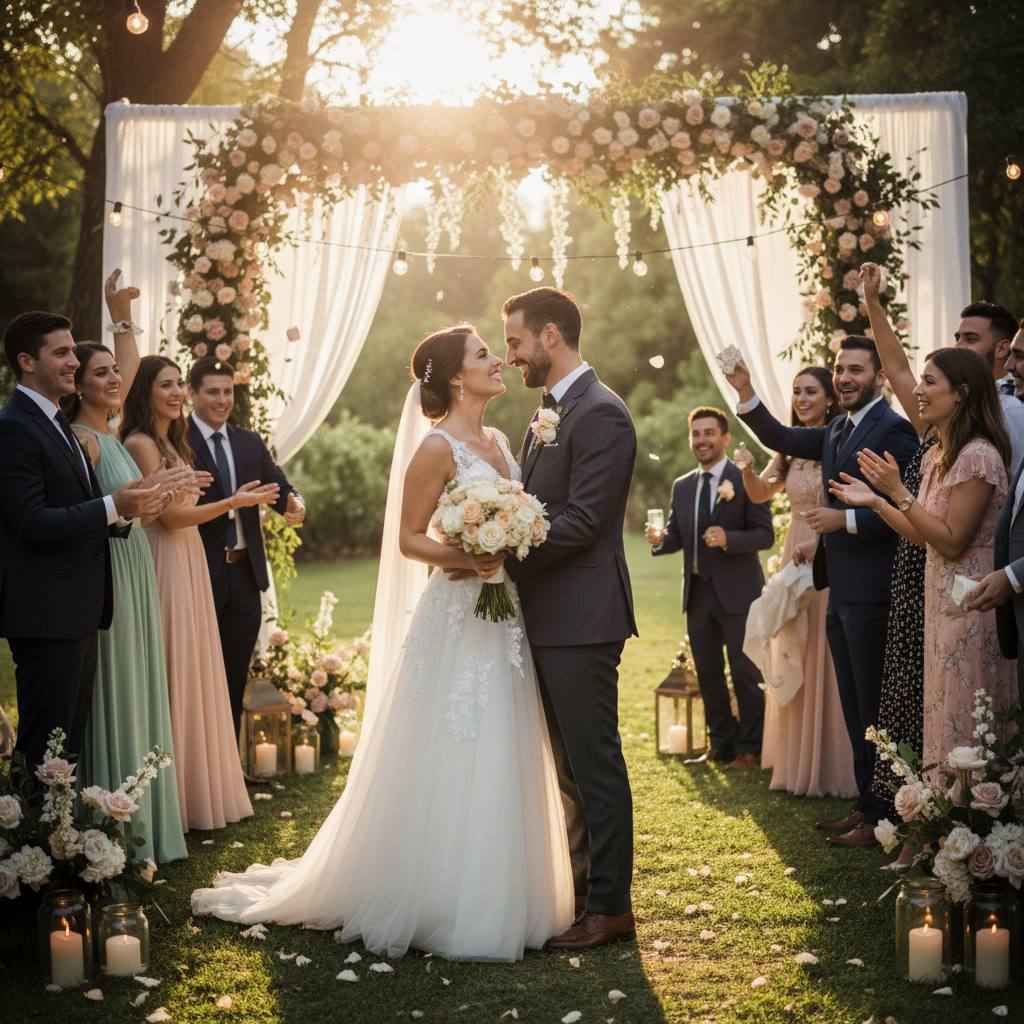
Table of Contents
Introduction
Planning a wedding is one of the most exciting milestones in life, filled with joyful anticipation and dreams of a perfect celebration. Yet, amid all the excitement, the reality of managing wedding finances often brings a wave of stress and overwhelm. Budgeting effectively can mean the difference between a joyous occasion and financial headaches that linger long after the last guest leaves. Whether you’re newly engaged or just starting to explore wedding planning, understanding how to set and maintain a realistic wedding budget is crucial to turning your vision into a memorable event without breaking the bank.
Many couples dive headfirst into planning without fully grasping the financial commitment involved, leading to unexpected expenses and difficult compromises. Weddings can be expensive affairs — in fact, recent surveys show that the average cost of a wedding in the United States exceeds $30,000, with some regions and styles far surpassing that figure. From venues and catering to attire and entertainment, every choice carries a price tag that quickly adds up. Without a clear budget framework, it’s easy to lose track of spending and feel overwhelmed by the sheer number of decisions.
However, budgeting for a wedding isn’t about limiting your dream or expecting to scrimp on what matters most. It’s about empowering you with control over your finances while still celebrating in style and meaning. Careful planning helps you prioritize your spending, identify areas where you can save, and stay aligned with your overall financial goals. Many couples also grapple with questions about who pays for what and how to navigate family contributions and traditions. Addressing these concerns early can prevent conflict and promote clarity throughout the planning process.
Besides the practical financial side, there’s a significant emotional component tied to wedding budgeting that often goes unspoken. Planning your special day is deeply personal, reflecting your values, tastes, and love story. It’s natural to want everything to be perfect, which can intensify the stress around finances. Balancing your hopes with reality requires thoughtful reflection, open communication with your partner and families, and a willingness to adapt as needed. The good news is, with the right guidance and tools, you can confidently approach budgeting as an enjoyable step toward your dream wedding rather than a daunting hurdle.
What You’ll Learn in This Guide
This comprehensive planning guide is designed to walk you through the essential steps of creating and managing your wedding budget. Whether you’re starting from scratch or seeking strategies to tighten your spending, you’ll find practical advice and expert tips tailored to your needs. Here’s a preview of what we cover:
- Setting Your Total Budget: We’ll help you estimate overall wedding costs and determine a budget range that fits your financial situation. Learn to factor in key influences, such as guest count, venue choice, and seasonal timing, so you can make informed decisions right from the start.
- Breaking Down Major Wedding Expenses: Understand the typical categories that consume most of your budget, including venue, catering, attire, photography, and entertainment. We provide guidance on how to prioritize spending and find options that meet your quality and financial expectations.
- Tips to Save Money Without Sacrificing Quality: Explore creative ways to stretch your budget, such as prioritizing what matters most, choosing off-peak dates or locations, and incorporating do-it-yourself or borrowed elements. These strategies can help you achieve a beautiful wedding experience while keeping costs manageable.
- Tracking, Adjusting, and Staying on Budget: Discover effective methods and tools to record expenses, review your spending regularly, and make adjustments as your plans evolve. Keeping a close eye on your budget minimizes surprises and promotes financial peace of mind throughout your wedding journey.
Throughout this guide, we aim to provide clarity and confidence, helping you anticipate challenges and equip yourself with actionable solutions. Whether you’re navigating the complexities of family contributions, weighing the benefits of professional help, or seeking ways to make the most of your resources, you’ll find valuable insights tailored to your unique situation.
We understand that every wedding and couple is different, which is why this guide emphasizes flexibility and personalization. Budgeting is not about rigid rules but about creating a plan that reflects your vision while respecting your means. With thoughtful preparation, you can embrace the excitement of planning while resting assured that your finances are under control.
As you progress through the sections ahead, you’ll gain a clear roadmap to successfully plan your wedding budget. From the initial estimation of costs to the detailed breakdown of expenses and practical tips for saving money, we cover everything you need for smart and stress-free preparation. By the time you finish reading, you’ll be equipped to take confident steps toward your ideal wedding day and enjoy the celebrations with financial peace of mind.
Let’s begin this journey together and transform the often overwhelming task of budgeting into a rewarding and manageable part of your wedding planning. Your dream wedding is within reach, and this guide will be your trusted companion every step of the way.

Planning a wedding is an exciting journey filled with joyful anticipation and countless decisions. However, managing the financial aspect can often feel overwhelming amidst all the celebrations and arrangements. Establishing and maintaining a clear budget is crucial to ensuring a beautiful day without the stress of financial surprises. In the following discussion, we’ll dive deeply into understanding how to set a total wedding budget that reflects your unique circumstances and explore ways to break down and manage the major expenses that come with planning your special day. This comprehensive insight will arm you with practical knowledge, aiding you to make informed decisions and keep your wedding planning firmly on track.
Understanding Your Wedding Budget
Constructing a wedding budget is the foundational step in guiding every subsequent choice for your big day. By deciding on a realistic total budget early on, you establish a financial framework that prevents overspending and helps prioritize what truly matters. This financial roadmap considers your overall resources, anticipates costs, and allows for contingencies, creating a level of flexibility and control. Setting your budget also fosters transparent discussions with all contributors, such as family members or partners, ensuring expectations are aligned and support is secured. To fully grasp this concept, it helps to understand the nuances of how to protect assets and financial planning that complement your budgeting goals.
Once the total budget is in place, breaking down your financial plan can help pinpoint expenses that require the greatest focus. This approach empowers you to balance splurges and savings intelligently while safeguarding important elements of your celebration. Additionally, clear awareness around who is funding the wedding—whether it be yourself, family members, or a combination—can significantly impact your spending decisions. Open conversations about contributions foster smoother planning and financial harmony. Understanding your financial boundaries means you can confidently negotiate with vendors and manage expectations for your dream wedding.
Key Aspects of Budget Setting
When starting your budget, it’s important to consider these main points which impact your financial planning:
- Estimating Costs Realistically: Having a clear estimate of overall wedding costs helps avoid surprises. Researching current market prices for venues and services gives a sound financial baseline, reducing guesswork and unexpected expenses.
- Factoring in Your Financial Situation: Your income, savings, and ongoing financial commitments directly influence how much you can comfortably allocate. It’s wise to create a buffer to manage unforeseen costs without jeopardizing your future stability.
- Knowing Who Pays: Traditions vary widely from full self-funding to family support or shared costs. Discussing these openly helps clarify responsibilities and avoid discomfort or misunderstandings later in the planning process.
- Setting a Range, Not a Fixed Number: Allowing a budget range rather than a strict single figure provides some flexibility to accommodate changes or unexpected opportunities, such as discounts or extras.
Breaking Down Major Wedding Expenses
With an established budget, the next step is dissecting your wedding costs into major categories. This breakdown helps highlight where your money will have the most significant impact and guides spending priorities for a balanced event. Typically, the biggest expenses include venue and catering, attire, and photography—elements that define much of the wedding’s aesthetic and guest experience. Understanding the typical costs associated with each category can empower you to negotiate better deals and avoid financial pitfalls. For a detailed breakdown of this step, see our guide on how to analyze financial statements which offers insights into managing complex budgets effectively.
Choosing the right venue and catering often accounts for a substantial portion of the wedding budget. Factors like location, guest count, and service style largely influence the final price. Similarly, selecting attire for the couple and key participants can range from high-end designer pieces to more budget-friendly options, offering a broad spectrum for various preferences and financial plans. Photography and entertainment are essential to capturing your memories and setting the atmosphere, respectively, and they also come with flexible options tailored to different budgets. Knowing these distinctions and alternatives prepares you to make smart selections in alignment with your overall budget.
Key Components of Wedding Costs
Let’s explore the main expense categories and their significant considerations:
- Venue and Catering: This includes rental fees, food and beverage choices, service charges, and sometimes decor. Prices vary widely depending on location prestige, season, and guest numbers. Booking during off-peak times or choosing less conventional venues may provide valuable savings.
- Attire and Accessories: Budgeting covers the wedding dress, suits or tuxedos, shoes, and jewelry. Shopping smart can involve exploring sample sales, renting, or buying second-hand to maximize style without excessive costs.
- Photography, Decor, and Entertainment: These add personality and lasting memories to your wedding day. Photographers vary by experience and package offered. Decor can range from DIY to professionally designed setups. Entertainment options include DJs, live bands, or curated playlists, catering to different atmospheres and budgets.
- Flexibility and Prioritization: Exactly where to allocate your resources depends on personal values—some may prioritize photography over decor, or venue over entertainment. Clearly outlining these preferences early helps avoid overspending on less important areas.

Conclusion
Planning your wedding budget is an essential foundation for a successful and enjoyable celebration. Throughout this guide, we’ve explored the importance of establishing your total budget early, considering your financial situation, contributions from family, and the various factors that influence how much you can realistically spend. Recognizing the key categories such as venue and catering, attire, photography, décor, and entertainment helps you allocate funds wisely and avoid surprise expenses. By understanding these core spending areas, you gain clarity and control over your finances, enabling you to make decisions that reflect your values and vision for the day.
We also highlighted practical strategies to save money without sacrificing quality—prioritizing the elements that matter most to you, considering off-peak dates or alternative locations, and incorporating DIY projects or borrowing where feasible. These tips empower you to stretch your budget further and maintain a balanced approach that puts your needs and preferences front and center. Additionally, tracking your expenses rigorously with budgeting tools and regular reviews ensures you stay on course and adjust as planning evolves, preventing overspending and financial stress.
Importantly, knowing when to seek professional assistance—whether through a wedding planner or a financial advisor—can add valuable expertise to your planning process. Professionals can help manage logistics, negotiate better deals, and offer expert advice that aligns with your budget goals, making your journey smoother and more confident.
Actionable Next Steps
Now that you have a comprehensive understanding of how to budget for your wedding effectively, it’s time to put these insights into practice. Start by calculating a realistic total budget based on your financial situation and anticipated contributions. List all potential expenses categorized by priority, and allocate funds accordingly. Use digital tools or spreadsheet templates to record every cost, updating your budget regularly to reflect actual spending.
Engage in open conversations with your partner and family early on to clarify financial expectations and contributions. This transparency reduces misunderstandings and creates a collaborative planning environment. Explore creative options to save, such as booking venues during off-peak seasons or choosing multi-purpose décor, and don’t hesitate to tackle some DIY projects to personalize your celebration while saving costs. Finally, monitor your spending closely, and make informed adjustments to stay on track throughout your planning process.
Final Thoughts
Budgeting for your wedding doesn’t have to be overwhelming. With thoughtful preparation, clear communication, and consistent monitoring, you can create a celebration that truly reflects your dreams and financial realities. Remember, the goal is a joyful, meaningful day without the burden of financial worry afterward. Embrace the budgeting process as a positive step toward an unforgettable wedding and a strong financial foundation for your life together. Your mindful planning today sets the stage for beautiful memories tomorrow.
Frequently Asked Questions
-
How much should I budget for a wedding?
- Budget varies greatly; consider your financial situation and priorities to set a realistic total amount.
-
What are the biggest expenses in a wedding?
- Typically venue, catering, attire, and photography are among the highest costs.
-
How can I save money on my wedding?
- Prioritize key elements, choose off-peak dates, use DIY options, and borrow where possible.
-
Should I hire a wedding planner to help with my budget?
- A planner can help manage budget and logistics but involves additional fees; consider based on complexity and your comfort level.
-
How do I keep track of wedding expenses?
- Use budgeting tools and regularly update your spending to stay on track.

